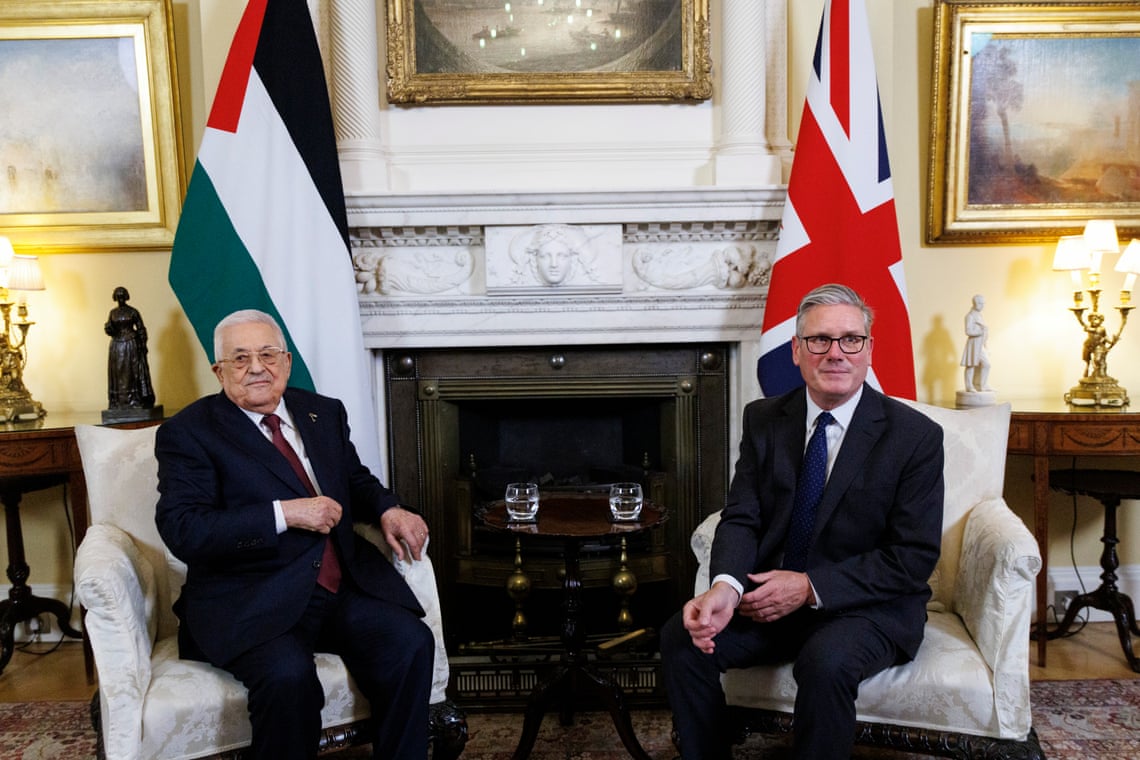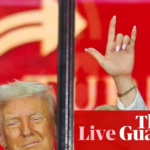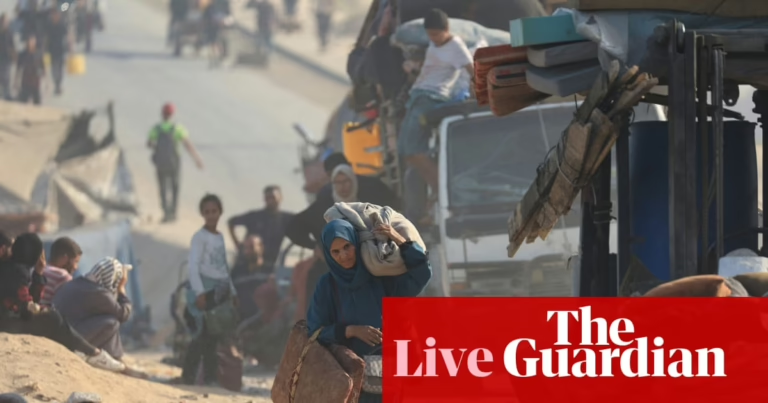European Authorities Caution Israel Against West Bank Annexation Amidst Growing Recognition of Palestinian Statehood
Our ongoing live updates resume, focusing on the conflict in Gaza and the surrounding diplomatic developments.
European leaders have issued stern warnings to Israel, urging restraint from annexing sections of the occupied West Bank as a reaction to Western nations formally acknowledging Palestinian sovereignty.
On Sunday, the United Kingdom, Australia, and Canada took the unprecedented step of officially recognizing Palestine as a state. This decision marked a significant divergence from the Trump administration’s stance and provoked a swift and vehement response from Israel.
Portugal followed suit with its recognition yesterday, while France is anticipated to announce similar support during the upcoming United Nations General Assembly in New York.
Israeli Prime Minister Benjamin Netanyahu condemned these recognitions, asserting that they embolden Hamas’ militant activities. He declared, “We have doubled Jewish settlements in Judea and Samaria (the West Bank) and intend to persist with this policy.”
In a more radical response, far-right Israeli Finance Minister Bezalel Smotrich and National Security Minister Itamar Ben-Gvir advocated for the full annexation of the West Bank as retaliation for the international endorsements of Palestinian statehood.
Smotrich expressed on X (formerly Twitter), “The era when Britain and other nations dictated our destiny is over. The appropriate reaction to this anti-Israel stance is to assert sovereignty over the historic Jewish homeland in Judea and Samaria and to permanently remove the notion of a Palestinian state from the table.”
The UK’s Foreign Secretary, Yvette Cooper, conveyed to the BBC that she has cautioned Israel against any annexation moves in response to the UK’s recognition of Palestine. This carries particular weight given Britain’s historical involvement in the establishment of Israel post-World War II.
“Our decision aims to uphold security for both Israelis and Palestinians,” Cooper stated. “It is about fostering peace, justice, and crucially, stability in the Middle East. We remain committed to collaborating with all regional stakeholders to achieve this.”
The UK’s recognition is based on the provisional borders of 1967, prior to Israel’s occupation of Gaza and the West Bank. This move is expected to facilitate the elevation of the Palestinian diplomatic mission, with Husam Zomlot likely to be appointed as a full ambassador.
Should Israel proceed with annexation, European officials are reportedly considering measures such as limiting trade with settlements, intensifying sanctions against violent settlers, and endorsing a 2024 advisory opinion from the UN International Court of Justice, which deemed Israel’s occupation illegal under international law, as reported by the Financial Times.
USB Union Mobilizes Nationwide Strike in Italy to Support Gaza
In a powerful display of solidarity with Gaza, the USB union has initiated a comprehensive strike across Italy, urging citizens to “Block Everything” in protest. This movement underscores the union’s commitment to international causes and highlights the intersection of labor rights and global political issues.
The strike has seen widespread participation, with dockworkers near the port of Genoa joining the movement. Their involvement not only amplifies the protest’s impact but also reflects the growing trend of labor groups engaging in political activism beyond traditional workplace issues.

This nationwide action is reminiscent of historical labor movements where workers have united to influence political discourse, akin to the solidarity strikes seen during the 1980s miners’ protests in the UK. Such collective efforts demonstrate the power of organized labor to affect change on both national and international stages.
By aligning their cause with the plight of Gaza, the USB union is emphasizing the importance of global awareness within local labor struggles. This approach encourages a broader understanding of how economic and political issues are interconnected, fostering a sense of global citizenship among workers.

The strike’s slogan, “Let’s Block Everything,” encapsulates the union’s strategy to disrupt normal operations as a form of protest, aiming to draw attention to the humanitarian crisis in Gaza. This tactic mirrors other global labor actions where disruption serves as a catalyst for political dialogue and change.
Overall, the USB union’s nationwide strike in Italy represents a significant moment where labor activism intersects with international solidarity, showcasing the evolving role of unions in addressing not only workers’ rights but also broader social justice issues.
Malta to Officially Recognize Palestinian State at UN Assembly
Malta is set to declare its formal recognition of Palestine as a sovereign state during the upcoming United Nations General Assembly session in New York, according to the Prime Minister’s office.
This Mediterranean island nation, a member of the European Union, has long supported Palestinian rights and advocated for a two-state solution, while simultaneously maintaining diplomatic ties with Israel.
Prime Minister Robert Abela initially revealed intentions to recognize Palestine earlier this year in May, but the UN meeting was postponed, delaying the official announcement.
Understanding the Practical Implications of Recognizing Palestine
Patrick Wintour, The Guardian’s diplomatic editor, has provided an insightful explanation on what recognition of Palestinian statehood entails in real terms. Here is a summary of the key points:
Recognition is primarily symbolic. When the UK announced its position, then Foreign Secretary David Lammy emphasized that it would not alter the situation on the ground.
However, it enables the UK to enter into formal treaties with Palestine and elevates the Palestinian head of mission to the status of a fully accredited ambassador.
Some suggest this could increase pressure on the UK to boycott products imported from Israeli-occupied territories.
More broadly, it signals support for Palestine’s future statehood and expresses disapproval of Israel’s refusal to engage in negotiations for a Palestinian state.
There are serious concerns that Israel might annex parts of the West Bank or render Gaza unlivable, forcing Palestinians to seek refuge in neighboring countries, thereby undermining the prospect of a Palestinian homeland.
Recognizing Palestine as a state with self-determination rights is a way to assert that Israel cannot unilaterally annex land deemed illegally occupied by the International Court of Justice.
The UK’s Position on Palestinian Statehood
The United Kingdom’s recognition of Palestine as an independent state is intended to uphold the vision of a two-state solution, where Palestine and Israel coexist peacefully.
There is widespread apprehension that Israel may soon annex the West Bank or make conditions in Gaza so dire that Palestinians are compelled to cross into Jordan or Egypt, effectively erasing the possibility of a Palestinian nation.
By recognizing Palestine’s right to self-determination, the UK aims to challenge any attempts by Israel to annex territories internationally recognized as illegally occupied.
Importantly, the UK set specific prerequisites for Israel, not Palestine, that if fulfilled, would have delayed Britain’s recognition. These conditions included a ceasefire in Gaza, cessation of Israel’s military operations, and a commitment to sustained negotiations toward a two-state resolution.

Israel Resumes Operations at Crucial Jordan Border Crossing
The Allenby Bridge, serving as the sole land passage between the Israeli-controlled West Bank and Jordan, has been reopened, according to an official from the Israeli authority overseeing the border, as reported by Reuters on Monday.
This crossing was temporarily shut down on September 19 following a shooting incident where a Jordanian truck driver fatally shot two Israeli soldiers.
Besides passenger transit, the Allenby Bridge is a vital conduit for commercial trade between Jordan and the West Bank.

Two prominent Israeli human rights groups, B’Tselem and Physicians for Human Rights, have accused Israel of committing genocide against Palestinians in Gaza.
Similar allegations have been echoed by international figures including Spanish Prime Minister Pedro Sánchez, former EU foreign policy chief Josep Borrell, and Amnesty International.
According to a recent UN investigation, Israel has engaged in acts amounting to genocide in Gaza since October 2023, with the explicit aim of annihilating the Palestinian population there.
The United Nations’ independent international commission of inquiry (COI), which operates separately from the UN itself, declared that “genocide is occurring in Gaza and continues unabated,” as stated by its chair, Navi Pillay.
Pillay emphasized, “The failure to act upon clear evidence of genocide equates to complicity. All nations have a legal duty to employ all feasible measures to halt the genocide in Gaza.”

The report implicates Israeli leaders including Prime Minister Benjamin Netanyahu, President Isaac Herzog, and former Defense Minister Yoav Gallant for inciting genocidal acts, while criticizing Israeli authorities for failing to hold them accountable.
Israel’s UN ambassador in Geneva, Daniel Meron, dismissed the report as a defamatory fabrication orchestrated by “Hamas affiliates.”
Mass Demonstrations and Strikes Sweep Italian Cities in Protest of Gaza Conflict
Across Italy, widespread protests, strikes, and blockades took place on Monday, driven by union calls to condemn what they describe as genocide in Gaza and to demand diplomatic and economic sanctions against Israel.
In Rome, hundreds of secondary school students assembled near Termini station, while demonstrations also erupted in Milan, Turin, Florence, Naples, Bari, and Palermo.
Port workers in Genoa and Livorno halted operations, aiming to prevent Italy from becoming a transit point for military supplies destined for Israel.
Public transportation in Rome was significantly disrupted, with many buses out of service and metro lines affected, according to reports from Agence France-Presse.
Despite these protests, Italy’s Prime Minister, Giorgia Meloni, who shares ideological ties with former US President Donald Trump, has expressed concern over the conflict but has not indicated plans to recognize Palestinian statehood at this time.
Rome has also shown hesitation in enforcing the European Union’s proposed trade sanctions against Israel.

The UN commission’s findings highlight multiple forms of Israeli actions that meet the criteria for genocide under the 1948 Genocide Convention, which defines genocide as acts committed with the intent to destroy, wholly or partially, a national, ethnic, racial, or religious group.
Specifically, the commission identified four qualifying acts: killing members of the group; inflicting serious bodily or mental harm; deliberately imposing living conditions calculated to bring about the group’s destruction; and enforcing measures to prevent births within the group.
Evidence supporting these conclusions includes testimonies from survivors and witnesses, medical professionals’ accounts, verified open-source materials, and satellite imagery analyses collected since the conflict’s onset two years ago.

Israel contests these allegations at the International Court of Justice, denying any genocidal intent or actions.
European diplomats have reportedly cautioned Israel against annexing sections of the occupied West Bank as a retaliatory measure following the recent recognition of Palestinian statehood by several Western nations.
On Sunday, the United Kingdom, Australia, and Canada officially acknowledged Palestinian statehood, marking a historic divergence from previous US policy and provoking a swift and vehement response from Israel.
Portugal also extended recognition recently, with France anticipated to follow suit during the upcoming United Nations General Assembly in New York.
Israeli Prime Minister Benjamin Netanyahu condemned the recognitions, asserting that they reward terrorism and announcing plans to double Jewish settlements in Judea and Samaria (the West Bank), continuing on this trajectory.
Far-right Israeli ministers, including Finance Minister Bezalel Smotrich and National Security Minister Itamar Ben-Gvir, have advocated for full annexation of the West Bank in response to these diplomatic developments.
Smotrich declared on social media that the era of foreign powers dictating Israel’s future is over, and that sovereignty over the historic Jewish homeland in Judea and Samaria is the sole appropriate response, effectively dismissing the prospect of a Palestinian state.
UK Foreign Secretary Yvette Cooper has publicly warned Israel against annexation plans, emphasizing the UK’s historic role in the region and the importance of safeguarding peace and security for both Israelis and Palestinians.
“Our decision aims to uphold security for Israel and Palestinians alike. It is about fostering peace, justice, and stability in the Middle East. We remain committed to collaborating with all regional stakeholders to achieve these goals.”
The UK’s recognition of a Palestinian state is based on the 1967 borders, prior to Israel’s occupation of Gaza and the West Bank, and is expected to lead to enhanced diplomatic relations, including upgrading the Palestinian mission in London to full ambassadorial status.
Should Israel proceed with annexation, European officials are considering measures such as restricting trade with settlements, imposing sanctions on violent settlers, and formally endorsing a 2024 advisory opinion from the UN International Court of Justice that deems Israel’s occupation illegal under international law.
Malta to Officially Recognize Palestinian State Today
Malta is set to formally acknowledge the statehood of Palestine during the upcoming United Nations General Assembly session in New York, according to an announcement from the Prime Minister’s office.
This Mediterranean EU nation has long supported Palestinian rights and the pursuit of a two-state solution, while simultaneously maintaining diplomatic ties with Israel.
Prime Minister Robert Abela initially revealed plans to recognize Palestine back in May, but the UN meeting was postponed, delaying the official declaration.
Meanwhile, the Israeli Defense Forces justify their ongoing offensive in Gaza City as an effort to dismantle Hamas’ military capabilities. Although no specific timeline has been provided for the ground operation, indications suggest it could extend over several months.
Despite widespread international criticism, Israel intensified its ground campaign in Gaza City last week, following weeks of relentless airstrikes that devastated entire residential blocks. Many Palestinians have been compelled to flee southward, even though safe refuge remains elusive.
The Israeli military has targeted numerous high-rise buildings, warning humanitarian organizations that only medical facilities will be spared, and has ordered the city’s population of approximately one million to evacuate.
However, hundreds of thousands, including vulnerable individuals unable to relocate, remain trapped amid a declared famine caused by Israeli restrictions on aid deliveries.
Repeated displacement has forced Palestinians into increasingly confined and overcrowded areas, which continue to face bombardment. Reports indicate that at least 15 Palestinians have been killed in Israeli strikes across Gaza since dawn, with 12 casualties in Gaza City alone.
On Monday, the Israeli military announced it had bolstered its forces across all combat zones nationwide, deploying air, land, and naval units during the Jewish New Year holiday period.
Canada became the first member of the G7 to officially recognize Palestinian statehood yesterday, with the UK quickly following. France, which has spearheaded efforts toward recognition, is anticipated to join this week.
Conversely, Germany and Italy-also G7 members-have expressed no current intention to recognize Palestine, advocating instead that such recognition should emerge from direct negotiations, despite the bleak outlook amid ongoing Israeli military actions.
German Foreign Minister Johann Wadephul emphasized as he departed for the UN that a negotiated two-state solution remains the only viable path to peace, security, and dignity for both Israelis and Palestinians. He noted that Germany views recognition as a concluding step, but stressed the importance of initiating the process now.
Japan, prioritizing its alliance with the US, reportedly does not plan to recognize Palestine at this time.
Understanding the Practical Implications of Recognizing Palestinian Statehood
Patrick Wintour, The Guardian’s diplomatic editor, offers insight into what formal recognition of Palestine entails:
Recognition is primarily symbolic. When the UK announced its position, then-Foreign Secretary David Lammy stated, “It will not change the situation on the ground.”
However, it enables the UK to enter into treaties with Palestine and elevates the Palestinian head of mission to the status of a fully accredited ambassador.
Some argue this could increase pressure on the UK to boycott products imported from Israeli-occupied territories.
Overall, recognition serves as a statement supporting Palestine’s future statehood and condemning Israel’s refusal to negotiate.
There are serious concerns that Israel may annex the West Bank or render Gaza unlivable, forcing Palestinians to flee into neighboring countries, thereby extinguishing hopes for a Palestinian homeland.
Recognizing Palestine’s right to self-determination challenges Israel’s attempts to annex land deemed illegally occupied by the International Court of Justice.
Why Is the UK Recognizing Palestinian Statehood Now?
The UK’s formal recognition of Palestine aims to uphold the vision of a two-state solution, where Palestine exists alongside Israel in peace.
Fears are mounting that Israel might annex the West Bank or make Gaza uninhabitable, pushing Palestinians into Jordan or Egypt and effectively ending the prospect of a Palestinian state.
By recognizing Palestine’s statehood and right to self-determination, the UK signals that Israel cannot unilaterally annex territory internationally recognized as occupied.
The UK had set conditions for withholding recognition, including a ceasefire in Gaza, cessation of Israeli military operations, and a commitment to long-term peace negotiations-none of which have been met.
In response to the wave of recognition, a US State Department spokesperson dismissed the moves as “performative,” emphasizing that the US remains focused on substantive diplomacy aimed at hostage release, Israel’s security, and regional peace free from Hamas.
Israeli Prime Minister Benjamin Netanyahu is expected to decide on his response to these recognitions following his upcoming visit to Washington later this month. Former President Donald Trump, who has opposed such recognitions in the past, has yet to comment on the recent developments.
It is anticipated that over 150 countries will have recognized Palestine by the end of next week, although some may attach specific conditions to their recognition.
Qatar Praises Western Nations’ Recognition of Palestine
Qatar has expressed support for the UK, Canada, Australia, and Portugal’s recognition of Palestinian statehood, viewing it as a positive step toward lasting peace in the Middle East.
The UK’s Deputy Prime Minister, David Lammy, who will represent Britain at the UN General Assembly, remarked that hopes for a ceasefire between Hamas and Israel were shattered following an Israeli airstrike on a Hamas delegation in Qatar earlier this month, which resulted in significant diplomatic tensions.
Hamas reported six fatalities in the strike, including the son of its exiled Gaza leader, Khalil al-Hayya, though its senior leadership and negotiation team survived.
Qatar, a close ally of the US, has played a pivotal role as a mediator, hosting Hamas’s political bureau since 2012 and maintaining a major American airbase near Doha.
Last week, US Secretary of State Marco Rubio urged Qatar to continue facilitating efforts to end the conflict, including securing the release of 48 hostages held in Gaza, disarming Hamas, and fostering a better future for Palestinians.
Despite international criticism, Israeli Prime Minister Netanyahu remains defiant, not ruling out further strikes against Hamas leaders “wherever they may be.”
Qatari Prime Minister Mohammed bin Abdulrahman bin Jassim al-Thani called on the global community to cease “double standards” and hold Israel accountable.
European Leaders Caution Israel Against West Bank Annexation Amid Recognition Moves
Our live coverage resumes on the ongoing conflict in Gaza and the surrounding diplomatic developments.
European officials have reportedly cautioned Israel against annexing parts of the occupied West Bank as a retaliatory measure against Western countries recognizing Palestinian statehood.
On Sunday, the UK, Australia, and Canada formally recognized Palestine, marking a historic divergence from the Trump administration’s stance and provoking a sharp rebuke from Israel.
Portugal also recognized Palestine, and France is expected to follow suit during the UN General Assembly this week.
Israeli Prime Minister Benjamin Netanyahu condemned the recognitions as rewarding “Hamas terrorism,” asserting that Jewish settlements in Judea and Samaria (the West Bank) have doubled and will continue to expand.
Far-right Israeli ministers Bezalel Smotrich and Itamar Ben-Gvir have called for full annexation of the West Bank in response to these diplomatic moves.
Smotrich declared on social media that the era of foreign powers dictating Israel’s future is over, advocating for sovereignty over the historic Jewish homeland and the permanent removal of Palestinian statehood from the agenda.
The UK’s Foreign Secretary, Yvette Cooper, informed the BBC that she has warned Israel against annexation in retaliation for the UK’s recognition of Palestine, a decision laden with historical significance given Britain’s role in Israel’s founding after World War II.
“We have been clear that this decision is about safeguarding security for both Israel and Palestinians,” Cooper stated. “It aims to protect peace, justice, and crucially, stability in the Middle East. We will continue engaging with all regional stakeholders to achieve this.”
The UK’s recognition is based provisionally on the 1967 borders, prior to Israel’s occupation of Gaza and the West Bank.
This development is expected to facilitate the establishment of comprehensive diplomatic ties, with Husam Zomlot, the Palestinian chief representative, anticipated to be elevated to the role of full ambassador.
Should Israel proceed with any form of annexation in the West Bank, European authorities are likely to respond by considering measures such as limiting commercial interactions with settlements, intensifying sanctions against settlers involved in violent acts, and officially endorsing a legal advisory opinion issued last year by the United Nations’ International Court of Justice. This opinion declared Israel’s occupation as contrary to international law, as reported by the Financial Times.

















